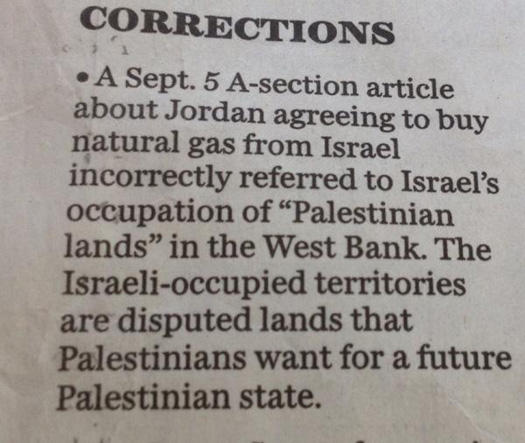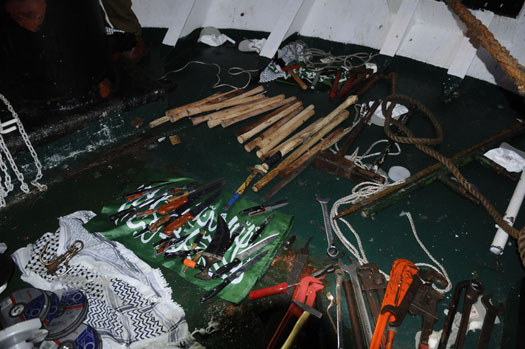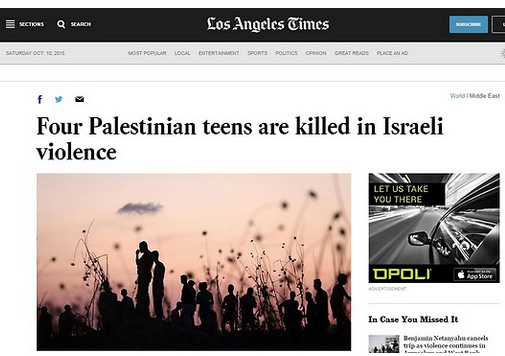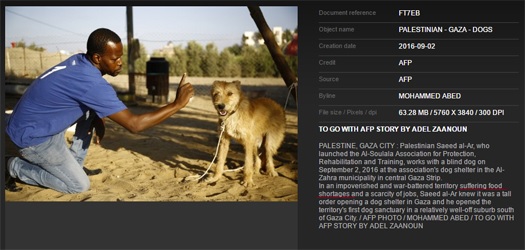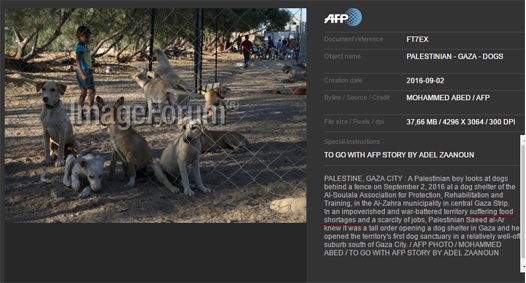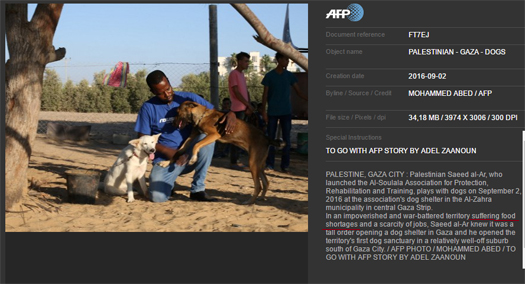Recent Entries:
Author: TS
December 18, 2016
AFP, MSNBC Also Err on ‘Palestinian Land’
In addition to NPR, this weekend Agence France Presse and MSNBC also incorrectly identify the disputed West Bank as “Palestinian land.”
Using partisan language, AFP today refers to some Israelis who “view Trump’s victory as an opportunity to expand settlements in the West Bank, Palestinian land occupied by Israel for nearly 50 years” (“Israelis look past anti-Semitism after Trump win,” emphasis added.)
On Dec. 16, NBC’s Katy Tur, reporting on Andrea Mitchell Report, also tripped up on the tendentious claim that the disputed West Bank is “Palestinian land.”
Just over four minutes into her report, Tur defines “settlers” for listeners as “Jews who are settling their homes in the West Bank which is, has been, Palestinian.”
Identifying the land as “Palestinian” completely endorses one side’s political claims over the other side’s claims in what is, in reality, an unresolved dispute. (Given AFP’s employment of reporter Nasser Abu Baker, who leads the boycott against Israeli journalists and recently ran for the Fatah Revolutionary Council, in a gross conflict of interest and violation of journalistic ethics, the agency’s unabashed bias regarding the so-called “Palestinian land” is hardly surprising, though certainly not excusable.)
But as a 2014 Washington Post correction, prompted by CAMERA, noted, the “Israeli-occupied territories are disputed lands that Palestinians want for a future Palestinian state.”
(more…)November 13, 2016
International Business Times Pulls a UNESCO on Temple Mount
In a headline and accompanying first paragraph, The International Business Times takes a page from UNESCO’s book on the Temple Mount, casting Judaism’s holiest site as Islamic only. “Israel Wants Jews To Pray at Muslim Mosque in Jerusalem: Temple Mount Tensions Grow in Middle East” is the grossly misleading headline about some Israeli lawmakers (not “Israel”) who seek Jewish prayer rights at Judaism’s holiest site.
Likewise, the article’s first sentence depicts the site as Muslim only, ignoring the reason why Jews would want to pray there:
Some Israeli lawmakers want to allow Jews to pray at an Islamic holy site in Jerusalem, a contentious proposal that is opposed by Middle Eastern leaders and could stroke tensions between Jews and Muslims in the Israel. Israel Parliament speaker Yuli Edelstein joined three cabinet ministers and three lawmakers Monday to demand Israeli Prime Minister Benjamin Netanyahu “open the gates” to the religious complex and rescind a year-long ban on Israeli lawmakers from visiting the site, the Times of Israel reported.
Not until the end of the second paragraph does reporter John Walsh acknowledge: “The compound sits on tops of the Western Wall in Jerusalem and is considered to be Judaism’s holist [sic] site.” How many readers, however, will make it past the misleading headline and first paragraph to get to the key information that the Israeli lawmakers are seeking Jewish prayer rights at the site because it is Judaism’s holiest site?
Other media outlets which reported on Jewish visits to or aspirations to pray at the Temple Mount, while describing the site as Islamic only and ignoring its status as Judaism’s holiest place, include Agence France Presse, The New York Times, The Telegraph and Times of London, all of which subsequently amended their misleading passages thanks to CAMERA and its British blog, UK Media Watch.
Ironically, The International Business Times article, with its skewed headline and first paragraph, is accompanied by an IBTvideo about UNESCO’s decisions which ignore Judaism’s connection to the site.
CAMERA urges The International Business Tribune to amend its headline and first paragraph to reflect the fact that some Israeli lawmakers are seeking Jewish prayer rights at the Temple Mount because it is Judaism’s holiest site, and not because it is a “Muslim mosque.”
November 6, 2016
In Haaretz Headline, Alleged Attack Becomes Fact
Not for the first time, a Haaretz headline upgrades an unproven Arab allegation to fact.
A page-one print headline in the English edition today states as fact: “Palestinians harvesting olives attacked by settlers.”
But as the accompanying article itself makes clear, Palestinians allege that settlers attacked olive harvesters, but that claim is under investigation and has not yet been confirmed. Jack Khoury and Yotam Berger wrote:
Four Palestinians were treated at a hospital in the West Bank city of Ramallah yesterday, reportedly after they were attacked by Jewish settlers near the village of Al-Janieh, west of Ramallah. The Israel Defense Forces and the Israel Police said they were investigating claims that around 20 people attacked the Palestinians with metal rods. (Emphases added.)
In addition, the headline and subheadline of the digital version of the article also makes clear that the claim is just that: “Palestinians Harvesting Olives Reportedly Attacked by Settlers Near Ramallah: Israeli authorities are investigating allegations that twenty assailants attacked four Palestinians west of Ramallah.” (Emphasis added.)
The page-one headline in the Hebrew print edition is likewise clear that the alleged incident has not been established as fact. It states (CAMERA’s translation): “Suspicion: Settlers Attacked Palestinians with Metal Rods and One Was Seriously Injured.”
(more…)October 30, 2016
AFP’s Error, Editorializing and Omissions
Weapons recovered from the “Mavi Marmara,” which AFP identified as an “aid ship” though it carried no aid (Photo from Israel Defense Forces) Agence France Presse, an influential news service, ran two articles yesterday which between them contained a factual error, key omissions, and editorializing.
In a factual error, the first sentence of yesterday’s article (“Gaza flotilla raid victims’ kin vow legal battle against Israel“) incorrectly characterized the “Mavi Marmara” as “a Gaza-bound aid ship.”
The “Mavi Marmara” was not an “aid ship” at all. As documented in the UN’s Palmer Report (p. 47), it carried 546 passengers but no humanitarian aid supplies for the people of the Gaza Strip:
If the flotilla had been a purely humanitarian mission it is hard to see why so many passengers were embarked and with what purpose. Furthermore, the quality and value of many of the humanitarian goods on board the vessels is questionable. There were large quantities of humanitarian and construction supplies on board the Gazze 1, Eleftheri Mesogeio and Defne-Y. There were some foodstuffs and medical goods on board the Mavi Marmara, although it seems that these were intended for the voyage itself. Any “humanitarian supplies” were limited to foodstuffs and toys carried in passengers’ personal baggage. The same situation appears to be the case for two other of the vessels: the Sfendoni, and the Challenger I. There was little need to organize a flotilla of six ships to deliver humanitarian assistance if only three were required to carry the available humanitarian supplies. The number of journalists embarked on the ships gives further power to the conclusion that the flotilla’s primary purpose was to generate publicity.
Earlier this month CAMERA’s BBC Watch prompted correction of the identical error, and CAMERA has contacted AFP to request that the wire service likewise correct.
Moreover, while “Mavi Marmara” passengers were not carrying aid, they were carrying weapons and they used these weapons to violently attack Israeli soldiers who boarded the ship, facts entirely ignored in the 633-word article.
September 21, 2016
LA Times’ Joshua Mitnick Casts Palestinian Attackers as Victims
In his report today on recent Palestinian violence, The Los Angeles Times’ Joshua Mitnick obscures the fact that all of the Palestinians killed in the last few days, along with the majority of those killed in the last year, were attackers (“Israeli military says teenager killed after trying to stab soldier“).
He writes:
Since Friday, Israeli security forces have reported at least nine knifing and car ramming attacks on targets in the West Bank and Jerusalem. Some six Palestinians and a Jordanian citizen have been killed in the violence, and several Israelis have been injured, including a 38-year-old border policewoman stabbed Monday morning outside Jerusalem’s Old City.
In this passage, Mitnick fails to make clear who were the perpetrators (Palestinians) of the knifing and ramming attacks and who were the targets (Israelis),
Further muddling the basic question of who were the attackers and who were the targets, the Times correspondent does not note that all six Palestinians killed, along with the Jordanian, were the perpetrators of the aforementioned knifing and ramming attacks. In at least a couple of the incidents (involving the Jordanian and an attack Saturday in Hebron) there is video evidence substantiating the Israeli information that the Palestinian fatalities were assailants. The Jordanian was responsible for the attack Monday in which the 38-year-old border policewoman was gravely injured, and her colleague was moderately injured. But Mitnick does not say so. Readers are left to their own to draw the conclusion that the six Palestinians and Jordanian carried out the stabbings and car rammings — or not.
Mitnick’s grossly misleading phrase “six Palestinians and a Jordanian citizen have been killed in the violence” is nearly as skewed as this egregiously distorted Los Angeles Times headline last year which editors corrected following CAMERA’s complaint:
Indeed, aside from two specific incidents — an attack Tuesday morning along with the murder of 13-year-old Hallel Ariel last June — nowhere does Mitnick specify that it is Palestinians who are responsible for the ramming and stabbing attacks of the last year.
Thus, he refers to “the string of stabbings, car attacks, and shootings that started during the same [holiday] period last year,” without specifying that Palestinians were the perpetrators. Again, readers may, or may not, deduce this information.
Mitnick again casts Palestinian perpetrators as victims, writing:
The wave of daily violence that started a year ago left more than 200 Palestinians and several dozen Israelis dead, though in the spring and summer the incidents subsided substantially.
In a gross omission, he ignores the fact that most of the more than 200 Palestinians killed were attackers, according to Israel. It is standard practice for media outlets across the board to include this information, and The Los Angeles has done so numerous times in the past.
CAMERA has raised these concerns with Times editors. Stay tuned for an update.
September 11, 2016
Biased Reuters, AFP Captions on Disputed Gaza Death
UPDATE, 5 pm EST: AFP, Reuters Add IDF’s Account to Captions on Disputed Gaza Death
Both Reuters and Agence France Presse, major photo services with thousands of clients across the world, published incomplete, tendentious captions Friday concerning a Gaza teen killed under disputed circumstances. While Palestinian sources claim that Israeli troops shot 18-year-old Abdel-Rahman Al-Dabbagh in the head during a border clash, the Israeli army said that it only used tear gas. As a Reuters new story accurately reported:
An 18-year-old Palestinian was killed during a rock-throwing protest near the Gaza-Israel border on Friday and a Palestinian health official said Israeli soldiers shot him, but the Israeli army said troops were not responsible.
Gaza health ministry spokesman Ashraf Al-Qidra said Abdel-Rahman Al-Dabbagh was killed by an Israeli bullet to the head during the border clash in the central Gaza Strip.
The Israeli military said troops had sought to contain the violence on the other side of the border fence and had used only tear gas.
“Dozens of rioters breached the buffer zone and attempted to damage the security (border) fence. … Forces stationed at the border used tear gas that led to the dispersal of the riot. Following a preliminary review, the Israel Defense Forces did not conduct the reported shooting,” a military statement said.
Nevertheless, in violation of Reuters’ policy to “take no sides, tell all sides,” Reuters’ captions about the incident completely ignore the information from the Israeli side. Reuters’ handbook further advises journalists:
Our text and visual stories need to reflect all sides, not just one. . . . We have a duty of fairness to give the subjects of such stories the opportunity to put their side.
Examples of Reuters’ one-sided captions, which left out the Israeli information, follows:
A man mourns the death of Palestinian youth Abdulrahman Al-Dabag, who medics said was shot dead by Israeli troops on Friday, at a hospital in the central Gaza Strip September 9, 2016. REUTERS/Ibraheem Abu Mustafa
A man mourns the death of Palestinian youth Abdulrahman Al-Dabag, who medics said was shot dead by Israeli troops on Friday, at a hospital in the central Gaza Strip September 9, 2016. REUTERS/Ibraheem Abu Mustafa
(more…)September 11, 2016
More BDS Falsehoods in The Toronto Star
Linda McQuiag claims BDS success, ignoring massive increase in foreign investments during last decade since the launch of the campaign The anti-Israel BDS movement (boycott, movement and divest) campaign has long used misinformation to garner support. It’s a shame that Canadian journalist Linda McQuaig follows suit (“Elizabeth May shouldn’t run away from BDS: McQuaig,” Aug. 22).
The Toronto Star should have learned from its 2013 experience, when CAMERA prompted corrections of false BDS claims that Meg Ryan and Bruce Willis heeded boycott calls and refused to perform in Israel.
Writing last month in The Toronto Star, McQuaig argued that BDS is successful, noting a “2014 UN report [which] found that foreign investment in Israel had dropped by almost half from the previous year, partly because of the campaign.” She ignores, though, the United Nation’s latest figures, which reflect an increase in direct foreign investment in Israel of over 70 percent in 2015 compared to the previous year.
Moreover, according to Bloomberg (“The Boycott Israel Movement May be Failing,” June 2016), “Foreign investments in Israeli assets hit a record high last year of $285.12 billion, a near-tripling from 2005 when the so-called Boycott, Divestment and Sanctions movement (BDS) was started.” The 2014 decline coincided with the summer 2014 war between Hamas and Israel. Given the overall growth in the last decade since the launch of BDS, the 2014 downturn cannot logically be attributed as a BDS success.
In another deception, McQuaig quotes Desmond Tutu alleging “racially segregated roads” in the Palestinian territories, echoing the bogus canard that there are “Jewish-only roads” in the West Bank, a falsehood about which CAMERA has prompted correction in numerous media outlets.
Finally, McQuaig misleads with her grossly inaccurate characterization of Israel’s occupation of the Gaza Strip. She erred, referring to “the fact that millions of Palestinians have been living under military occupation in the West Bank and Gaza for almost 50 years, with Israel effectively annexing their land.” (Emphasis added.)
Her errors are three-fold: Israel’s 38-year occupation of the Gaza Strip is not “nearly 50 years old.” Nor, contrary to her assertion, are Gazans still living under Israeli occupation. Nor did Israel “effectively annex” the Gaza Strip.
Israel’s occupation of the Gaza Strip (formerly under Egyptian sovereignty) lasted from 1967 until 2005, when Israel pulled out every last soldier and civilian (alive and deceased, even uprooting graves) from the Gaza Strip. Far from “effectively annexing” the Gaza Strip, Israel has fully withdrawn. Hamas, listed as a terror organization by Canada, the United States, and the EU, governs the territory.
CAMERA has contacted editors on the last point to request a correction. Stay tuned for an update.
September 5, 2016
AFP Misleads Again, This Time About World Vision
In an article today about doubts in Gaza regarding Israel’s case against World Vision‘s Mohammed al-Halabi, charged with diverting tens of millions of dollars in aide to Hamas, Agence France Presse claims (“Gazans, NGO question Israeli charges against aid worker”):
The German and Australian governments, as donors, have additional mechanisms including external audits and they have found no major concerns.
Both the German and Australian governments have suspended their aid to World Vision, a rather unusual response for those who have allegedly cleared the aid organization of significant wrongdoing. While AFP itself noted on Aug. 11 that “Germany and Australia have suspended aid to World Vision,” today’s story completely omits this fact, leaving readers with the impression that Germany and Australia have cleared the organization.
CAMERA was not able to independently verify the claim that the two governments carried out audits which revealed no significant wrongdoing on the part of World Vision. CAMERA has requested that AFP either substantiate the claim, or correct. In addition, the fact that Germany and Australia cut off aid to World Vision should be added to the story.
In a separate AFP article today (“Jerusalem police kill Palestinian would-be attacker“), the influential wire agency deviates from its standard formulation regarding Palestinian fatalities. Today’s article omits the key point that the majority of those Palestinians killed were carrying out attacks against Israelis. The incomplete passage is:
Violence has surged in the Palestinian Territories and Israel since October 2015, costing the lives of 223 Palestinians, 34 Israelis, two Americans and one Eritrean and Sudanese respectively, according to a tally by AFP.
This article omits the following critical information which appears in other AFP articles:
Most of the Palestinians killed were carrying out knife, gun or car-ramming attacks, according to Israeli authorities.
CAMERA has contacted editors to request that they add this key information.
See also from today: “AFP Misleads on Gaza ‘Food Shortages’“
September 5, 2016
AFP Misleads on Gaza ‘Food Shortages’
An Agence France Presse article yesterday about a dog shelter in the Gaza Strip begins:
In an impoverished and war-battered territory suffering food shortages and a scarcity of jobs, Saeed al-Ar knew it was a tall order opening a dog shelter in Gaza.
AFP photo captions about the dog shelter likewise contained the claim about alleged food shortages in the Gaza Strip.
While food security is a major problem in the Gaza Strip due to poverty, the territory is not suffering from food shortages. As the World Food Programme reports, “Though food is readily available in Palestine, prices are often too high for poor families to afford.”
As AFP reported on Feb. 10, 2016, “nearly half of the population has insufficient access to healthy food.”
According a 2014 joint press release by the Palestinian Central Bureau of Statistics (PCBS), The Food and Agriculture Organization of the United Nations, and the United Nations Relief and Works Agency for Palestine Refugees in the Near East and the World Food Programme:
In Palestine, food insecurity is driven by high rates of poverty resulting from unemployment, which is in part due to ongoing Israeli access and movement restrictions, as well as high prices for food and economic shocks. Food is available in markets, but expensive, so households reduce the variety and nutritional value found in their diet. The majority of Palestinians in the Gaza Strip and the West Bank spend more than half their income on food. (Emphasis added.)
CAMERA has contacted AFP to request a correction. Stay tuned for an update.
August 15, 2016
New York Times Casts Olympians’ Anti-Israel Hostility As Mutual Animosity
In a sports story on the Egyptian judoka who refused to shake hands with his Israeli opponent, The New York Times misleadingly depicts a pattern of anti-Israel hostility on the part of Muslim and Arab Olympians as “animosity between Israeli and other Middle Eastern athletes,” as if the two sides are equally engaged in hostile acts directed against the other side. In his Aug. 13 article about Islam El Shehaby’s snub of Or Sasson (“Egyptian Refuses Handshake After Losing to Israeli“), Victor Mather writes:
There is a history of animosity between Israeli and other Middle Eastern athletes at the Olympics, including in judo.
Mather helpfully goes on to cite examples, all of which tellingly point to one directional hostility: Arab and Muslim athletes snubbing Israeli competitors. First, he cites last week’s incident in a Lebanese team prevented an Israeli team for boarding a bus. Then, he notes that last Tuesday, a Saudi judo player forfeited a match, reportedly to avoid competing against an Israeli. Finally, The Times’ Mather cites a 2004 incident in which Iranian judoka Arash Miresmaeili apparently binged in order to be disqualified so as to not to face off against an Israeli.
Indeed, Israeli Olympians are consistently on the receiving end of Arab and Muslim animosity so why misleadingly characterize the hostility as “animosity between Israeli and other Middle Eastern athletes”?
See also “AFP Headlines Conceal Egyptian, Lebanese Bad Sportsmanship at Olympics“
Search:
Search this site:


